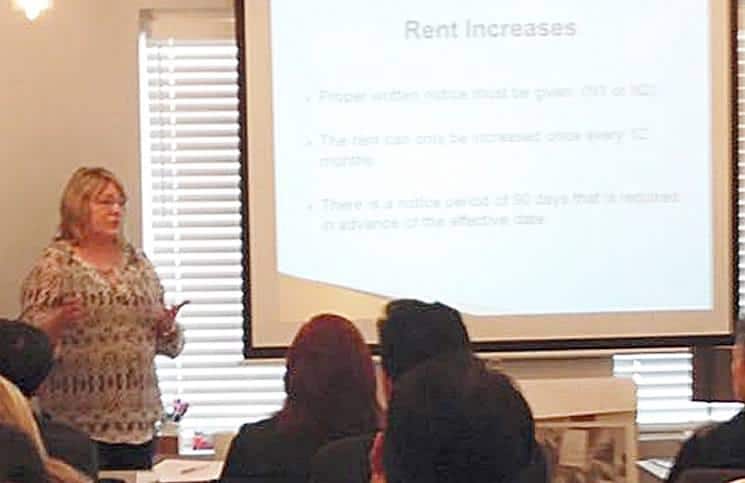Ask people who have attended one of Kathy Paliwoda’s informative, no-nonsense real estate classes and they will tell you that this is a woman who has seen it all in the investment property industry. She was a licensed real estate agent in 1978, educating the public when Scott McGillivray was still in diapers, long before transforming basements into mortgage payments became the norm.
As a a former practicing paralegal and real estate agent, real estate educator and sought-after consultant, Paliwoda now spends much of her time teaching real estate professionals and those looking to take the leap and become a landlord.
With skyrocketing property prices, over leveraged homeowners have purchased with the financial need to rent out part of their homes to make ends meet. This becomes even more of a priority with the expectation that interest rates must escalate in years ahead. To make intelligent buying decisions, it’s essential to understand the rules of the game, particularly because the rules keep changing.
Whether clients are first-time home buyers, empty-nesters looking for retirement income or real estate agents looking to help their clients make smart decisions, it is essential that people understand the law and the financial implications. Far more than the provincial Residential Tenancies Act, owners and agents must also be aware of key points in human rights, privacy and Condominium Act legislation too.
With more than 1.3 million renter households in Ontario (29 per cent of Ontario’s households) and a major trend towards condominium investment units, Paliwoda believes it is essential to get the facts out there.
To help people navigate this minefield, Paliwoda is on tour with ICIWorld.com, running six-hour Ontario Landlord’s Rights & Obligations 2015 sessions. The course is part of a series of real estate seminars she leads throughout the year that cover the do’s and don’ts of purchasing, renting and managing residential rental property.
While there are many financial benefits to becoming a landlord, Paliwoda is quick to acknowledge that there are also many pitfalls and misconceptions that never make it to television or conventional real estate training programs.
Having taught residential tenancy law since 1984, she has heard horror stories from thousands of landlords and real estate agents who attend her sessions. Many say they didn’t realize how little they actually knew. They return annually for refreshers and updates.
One of the biggest misconceptions according to Paliwoda is that landlord tenant laws are balanced. “The truth is that Ontario’s landlord tenant legislation leans heavily in the favour of the tenant. With each piece of legislation, there are many restrictions that landlords must follow, even if the previous owner was not.”
Paliwoda adds that fines have become tougher in recent years too. “Fines for committing an offence under the Act for an individual landlord are up to $25,000, and for a corporate landlord they are up to $100,000,” so it pays to stay out of the proverbial penalty box.
It’s also important to note that fighting or appealing a landlord tenant dispute can be quite expensive and time consuming to resolve, during which landlords often lose significant rent and cannot evict tenants in arrears.
Landlords must understand that damage deposits are illegal, that residential private sector tenants cannot be forced out because they have a pet, or that they can’t prevent students from renting, which is discriminatory. However, if they are renting out a condominium, there is an exception to the pet rule, for example, because the Condominium Act supersedes other legislation.
On the purchasing side, Paliwoda shares a valuable, little-known tip for Ontario landlords. “People ask me all the time, what types of investment properties they should be buying. I advise them to consider buying properties built after Nov. 1, 1991 with rental units, because they are not subject to rent controls in Ontario. An owner subject to rent control is looking at a statutory rent increase limit of only 1.6 per cent for 2015. But for post Nov. 1, 1991 properties, a landlord is free to charge whatever the market will bear.”
Kathy Paliwoda’s top 10 tips for landlords
- Educate yourself before you decide to invest in a residential income property.
- Establish clearly what you may be up against and walk away before it’s too late.
- Be prepared to follow the rules or face the consequences.
- Anticipate potential financial risks – rental income loss due to tenant turnover or evictions.
- Avoid “get rich schemes and dreams”. They seldom work.
- Get professional advice when needed. Winging it can have bad financial consequences.
- Know who you are renting to before you hand over the keys.
- The difference between success and failure as a landlord is what type of property people buy and where they buy the property.
- Don’t be misled. Be prepared to do your own homework. Due diligence is the key.
- Keep informed. Stay up to date, because the rules of the game change.
For a list of Paliwoda’s upcoming seminars, click here.
Heath Applebaum is a contributing writer for REM.















